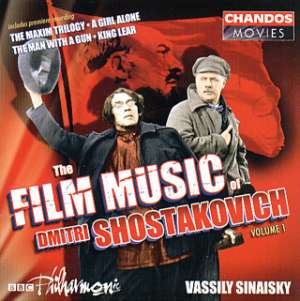************************************************************** EDITOR’s CHOICE January 2003 **************************************************************
The Film Music Of Dmitri Shostakovich
The Maxim Trilogy: The Youth Of Maxim (1935) / The Return of Maxim (1937) / The Vyborg Side (1939)
The Man With A Gun (1938)
A Girl Alone (1931)
King Lear (1970)
BBC Philharmonic conducted by Vassily Sinaisky
Sheffield Philharmonic Chorus, chorus master Darius Battiwalla
Available on Chandos Records No: CHAN 10023
Running time: 75:16
Crotchet Amazon US

It would usually be a pleasure to review a recording of vintage film scores – to relive through music a wonderful movie or two of yesteryear - and whilst it remains a pleasure to review this stunning new recording of a number of early Dmitri Shostakovich film works there is no feeling of nostalgia, or even of recognition, as all the movies are unknown to me! Yes, I know, the Maxim trilogy has aired at art houses throughout the world, and I should have got off my bum and made the effort to see these venerated films – and yes, I do know Shakespeare's "King Lear", right down to the foot notes and stage directions, but the Russian film featured here has eluded me. And I may perhaps be forgiven for not being familiar with The Man With A Gun and A Girl Alone. But never mind. The music is the thing. And that is superb.
As might be expected, dating from the Thirties, the music from the Maxim trilogy initially exudes political fervour, with orchestra and chorus immediately extolling (Soviet) camaraderie and making a powerful play for our emotions. Goodness - the ploy works – after hearing this I almost singed up to the party myself! The remainder of the suite presents an extraordinarily varied roster of moods – a searing adagio led by cello, a fervent waltz of imperialistic proportions, and lots of thunderous "storming the barricades" stuff which instantly and irrevocably sends most current Hollywood action music straight to the doghouse. Thrilling.
The scoring of Man With A Gun is no less nationalistic – or militaristic - the subject being Lenin – and the October revolution. Shostakovich ably waves the flag of folk song and sets to storming yet more barricades. Goodness, thrilling too …!
A Girl Alone permits a change of pace – and locale – and musical style - as the film tells the tale of a Leningrad teacher despatched to a remote rural village in Altai. In the main the scoring is chamber-orientated, with small select ensembles deployed to extraordinary effect. There is a real sense of the composer experimenting with orchestral colour, and geography is succinctly suggested, the music artfully illustrating a harsh landscape. No barricades to be stormed here … but sheep to be herded and huts to be tended. This is music of unusual and prodigious invention.
That tragedy is the hallmark of King Lear is emphasised by Shostakovich in no uncertain terms. His scoring here is grim-visaged, and immediately engages a dark brooding power accentuated by a series of adagio portraits only momentarily relieved by the rousing yet still bleak storm music. A sterling exercise in melancholia.
There has been much discussion over the years about whether conductors of the same ethnic origin as the repertoire bring some additional understanding or insight to the performance of the music. Well, I don't know whether a conductor of any other nationality could have done better than the Russian Vassily Sinaisky has with this recording – but I rather think not, as his readings excite and move and impress to a momentous degree. And The BBC Philharmonic play with a passion which is stratospheric - at one moment peaking on the Richter scale, and at others delicately balanced to etch the merest of orchestral hues. In this they are aided by a superlative recording, set in an expansive acoustic that serves the composer's most demonstrative passages well, yet still sufficiently detailed to indicate the subtlest of instrumental signatures. Happily over the years there have been a number of recordings of Shostakovich film music, but this album, in repertoire, performance, and in recording celebrates a particular high-point.
David Wishart
5
Return to Index